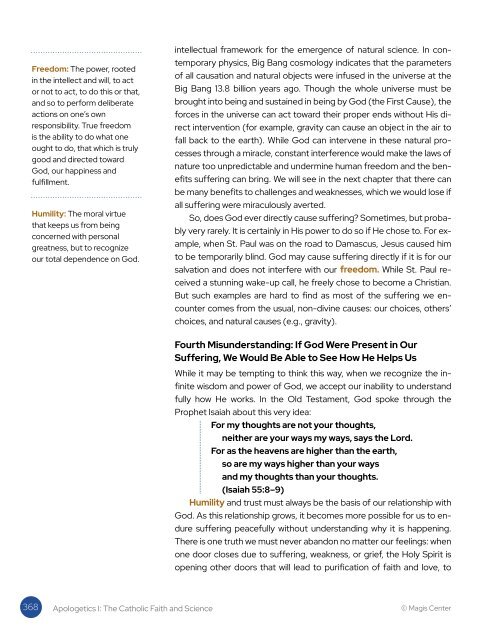CFS-WB-CH18
Create successful ePaper yourself
Turn your PDF publications into a flip-book with our unique Google optimized e-Paper software.
Freedom: The power, rooted<br />
in the intellect and will, to act<br />
or not to act, to do this or that,<br />
and so to perform deliberate<br />
actions on one’s own<br />
responsibility. True freedom<br />
is the ability to do what one<br />
ought to do, that which is truly<br />
good and directed toward<br />
God, our happiness and<br />
fulfillment.<br />
Humility: The moral virtue<br />
that keeps us from being<br />
concerned with personal<br />
greatness, but to recognize<br />
our total dependence on God.<br />
intellectual framework for the emergence of natural science. In contemporary<br />
physics, Big Bang cosmology indicates that the parameters<br />
of all causation and natural objects were infused in the universe at the<br />
Big Bang 13.8 billion years ago. Though the whole universe must be<br />
brought into being and sustained in being by God (the First Cause), the<br />
forces in the universe can act toward their proper ends without His direct<br />
intervention (for example, gravity can cause an object in the air to<br />
fall back to the earth). While God can intervene in these natural processes<br />
through a miracle, constant interference would make the laws of<br />
nature too unpredictable and undermine human freedom and the benefits<br />
suffering can bring. We will see in the next chapter that there can<br />
be many benefits to challenges and weaknesses, which we would lose if<br />
all suffering were miraculously averted.<br />
So, does God ever directly cause suffering? Sometimes, but probably<br />
very rarely. It is certainly in His power to do so if He chose to. For example,<br />
when St. Paul was on the road to Damascus, Jesus caused him<br />
to be temporarily blind. God may cause suffering directly if it is for our<br />
salvation and does not interfere with our freedom. While St. Paul received<br />
a stunning wake-up call, he freely chose to become a Christian.<br />
But such examples are hard to find as most of the suffering we encounter<br />
comes from the usual, non-divine causes: our choices, others’<br />
choices, and natural causes (e.g., gravity).<br />
Fourth Misunderstanding: If God Were Present in Our<br />
Suffering, We Would Be Able to See How He Helps Us<br />
While it may be tempting to think this way, when we recognize the infinite<br />
wisdom and power of God, we accept our inability to understand<br />
fully how He works. In the Old Testament, God spoke through the<br />
Prophet Isaiah about this very idea:<br />
For my thoughts are not your thoughts,<br />
neither are your ways my ways, says the Lord.<br />
For as the heavens are higher than the earth,<br />
so are my ways higher than your ways<br />
and my thoughts than your thoughts.<br />
(Isaiah 55:8–9)<br />
Humility and trust must always be the basis of our relationship with<br />
God. As this relationship grows, it becomes more possible for us to endure<br />
suffering peacefully without understanding why it is happening.<br />
There is one truth we must never abandon no matter our feelings: when<br />
one door closes due to suffering, weakness, or grief, the Holy Spirit is<br />
opening other doors that will lead to purification of faith and love, to<br />
368 Apologetics I: The Catholic Faith and Science<br />
© Magis Center


